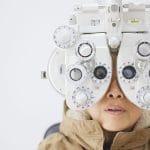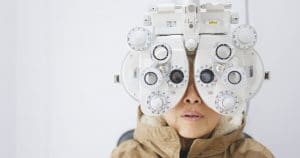How Does Cataract Surgery Feel?
Cataract is an eye disease that occurs due to clouding of the lens in the eye, thus blocking vision. The view will appear foggy, smoky, indecisive, because the eye lens is cloudy. Cataract cases occur in the elderly related to the aging process. Even so, cataracts can happen to anyone and it is possible at an early age, such as adolescents and children. Surgery is the main therapy to restore vision function, and this is related to the quality of life in the future. In cataract surgery, the cloudy natural lens is removed and replaced with an artificial lens. These artificial lenses are made of silicone or plastic. An artificial lens is inserted to take over the focus of vision.

The choice of eye lens implant type is made according to your eye health condition and needs. If you choose a multifocal lens implant will have good distance and near vision. Meanwhile, those who choose conventional monofocal lens implants will correct distance vision.
Compiled from WebMD, the goal of selecting multifocal lens implants is to reduce dependence on reading glasses after surgery. In this study, the researchers included 250 patients, divided equally between patients who received conventional multifocal and monofocal lenses. All patients underwent cataract surgery on both eyes, and both eyes had similar lenses. Three months after surgery, the multifocal patients had better near vision rates than the conventional lens group. The patient’s corrected average distance vision was also better for multifocal lenses.
Things to Expect from Cataract Surgery
Cataract surgery is a simple eye surgery to remove the cloudy eye lens and replace it with an artificial eye lens. This procedure is common and safe. After surgery, you can see better. If you do not want to use reading glasses after cataract surgery, multifocal lenses can be the right choice for you.
Who Should Perform the Surgery?
If you have cataracts, you do not necessarily need cataract surgery. You may not even notice a change in your vision. Some people who have this condition see best if they wear glasses as prescribed by a doctor, or rely on brighter lighting. But, you need to be careful when cataracts get worse, it can cause more symptoms. You will experience foggy, dim, or blurred vision. Not only that, you also have double vision when you see something through your eye with cataracts. These problems can make it difficult for you to read, work at a computer, and do other activities that require unobstructed vision.
One complaint that you feel is that you may have poor eyesight and find it more difficult to drive when it is dark at night. You are also more sensitive to glare from lights. A person with advanced cataracts can even fail a vision test on a driving test. Cataracts can make you more sensitive to glare from the sun. You will see halos around the bright light. This prevents you from wanting to be outside for too long. It even makes it more difficult for you to exercise, such as skiing or golf. If you experience any of these symptoms, surgery can help. In addition, in severe cataracts, further complications can arise such as increased eye pressure / glaucoma, and inflammation due to the melting lens material.
Preparation for Cataract Surgery
A week or two before the procedure, your doctor will perform several tests to assess the parameters and shape of your eyes. Usually, biometry is used to measure the cornea and lens. In this way, it aims to find out what type of lens is suitable for patients. The doctor will tell you the types of lenses suitable for the patient. Furthermore, during the preoperative consultation, the doctor will also confirm whether there is a history of allergies, is taking certain drugs and a history of other diseases.
What Happened?
During cataract surgery, the doctor will give you an anesthetic eye drops so you won’t feel sick. You will be awake during this procedure because of the local anesthetic that keeps the eye area in place during the operation. If you feel anxious during surgery, your doctor will give you a sedative to help you relax.
The doctor will make a small incision in the cornea of your eye. Through this gap, will insert a small instrument to destroy the cataract and gently remove it. Next, a new artificial lens, made of plastic, silicone, or acrylic will be installed, and cover the wound on the cornea. The duration of the operation is between 15-30 minutes. Usually after surgery, you can go home and do not need to stay in the hospital. However, it will take someone to help drive you home. What if you have cataracts in both eyes? You will have two separate surgeries, usually a few weeks. This gives the first eye a chance to heal.
Side Effects of Cataract Surgery
The side effects of cataract surgery, but some of the risks that can occur are as follows.
- Dry eyes
- Eye infection or swelling
- Temporary increase in eye pressure 12-24 hours after surgery
- Eye nerve disorders
After Cataract Surgery
Your eyes will feel lumpy a few days after cataract surgery. In no time, you can see clearly. Your doctor will give you eye drops to prevent infection. You must rest for a few days. Driving will be prohibited, and you may not, pick up heavy objects, or force your eyes. For the first week, your doctor will recommend that you wear eye protection while you sleep so you do not get stressed or dirty. If you are in pain or feel your eye is not healing properly, tell your doctor immediately. Usually in 4-6 weeks (about 1 and a half months) after surgery, your eye will heal completely and about 90% of people see optimally. So, now you can imagine how cataract surgery feels right?
Cloudy Vision After Cataract Surgery
Sometimes after cataract surgery, you will find that everything starts to look cloudy again. It happens because the lens capsules the part of your eye that holds your new artificial lens starts to thicken. You may hear your doctor refer to this by its medical name: posterior capsule opacification. The problem may not arise right away. You will notice it months or years later. Your doctor may suggest a procedure called an Nd-YAG laser capsulotomy to correct it. This procedure takes a few minutes and is painless. Your doctor will use a laser to remove a cloudy capsule lens so that light can enter through your artificial lens to its fullest. It will clear up your blurry vision.
If you have cataracts and are not compliant you cannot do cataract surgery. The Ciputra SMG Eye Clinic is here to answer your needs to care for your eyes. Do not miss the latest technology that is relevant for patient use. One of them is using The New CENTURION Vision System, which is one of the most advanced and best Phaco machines, which is the latest generation for correcting cataracts in the eye.
This technology has a system that automatically adapts to various changes in eye conditions during surgery. The New CENTURION Vision System ensures the operation process runs safely, stably, and with satisfying results. So, what are you waiting for? Immediately consult your eye condition at SMG Eye Clinic Ciputra.
Review by dr. Azrina Noor, SpM
Source













